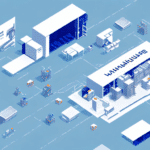Swisslog vs. Locus Robotics: A Comprehensive SEO Analysis
In the realm of warehouse automation, two companies have emerged as frontrunners: Swisslog and Locus Robotics. Both offer state-of-the-art technologies and solutions for businesses aiming to enhance the efficiency and productivity of their operations. This article delivers an in-depth analysis of Swisslog and Locus Robotics, comparing their advantages, disadvantages, and suitability for varying business needs.
Overview of Swisslog and Locus Robotics
Swisslog
Swisslog is a global leader in providing warehouse automation and software solutions. Their portfolio includes automated storage and retrieval systems (AS/RS), conveyor systems, and comprehensive warehouse management software. Swisslog's offerings are engineered to optimize the flow of goods, reduce lead times, lower labor costs, and minimize errors in logistics operations.
Locus Robotics
Locus Robotics specializes in robotic solutions for warehouse fulfillment. Their flagship product, the LocusBot, is a mobile robot designed to pick and transport items within a warehouse or distribution center. Locus Robotics' software optimizes pick paths, reduces travel time, and enhances picking accuracy, making it a robust solution for high-volume operations.
Technological Advancements
Both Swisslog and Locus Robotics have made significant strides in warehouse automation. Swisslog has bolstered its offerings with advanced software solutions that integrate seamlessly with existing warehouse management systems. Their commitment to sustainability is evident in technologies like PowerStore, which employs regenerative braking to cut energy consumption. Meanwhile, Locus Robotics continues to innovate by enhancing robot capabilities, such as incorporating vision systems for real-time obstacle detection and developing new products like the LocusPicking system, which utilizes augmented reality to guide workers through the picking process.
The History and Background of Swisslog and Locus Robotics
Swisslog
Swisslog was established in 1900 as a cutting tool manufacturer and has progressively expanded its range of services and products over the decades. In 2007, Swisslog was acquired by the German automation company KUKA, becoming a division of the KUKA Group. Today, Swisslog operates in over 20 countries with a workforce exceeding 2,500 employees.
Locus Robotics
Locus Robotics, founded in 2014 by a team of seasoned logistics and robotics experts, has swiftly become a key player in the warehouse automation market. The company has attracted significant investments from major retailers and venture capital firms, fueling its rapid growth and innovation.
Contributions to Warehouse Automation
Both companies have significantly advanced warehouse automation. Swisslog offers a broad spectrum of solutions, including AS/RS, conveyor systems, and software. In contrast, Locus Robotics specializes in collaborative robots, or "cobots," that work alongside human workers to enhance efficiency and productivity. Their innovations are reshaping the future of logistics and supply chain management.
Core Competencies of Swisslog and Locus Robotics
Swisslog's Core Competencies
Swisslog's core competencies lie in designing, engineering, and installing complex warehouse systems that integrate both hardware and software. Their solutions are highly scalable and configurable, tailored to meet the unique needs of individual customers. Swisslog also emphasizes system maintenance and support, ensuring maximum uptime and minimal operational disruptions.
Locus Robotics' Core Competencies
Locus Robotics focuses on providing flexible, scalable, and agile robotic solutions that can be rapidly deployed and integrated with existing warehouse management systems. Their software optimizes warehouse operations, allowing companies to manage larger order volumes and reduce operational costs. Additionally, their robot fleet management software offers real-time tracking and task prioritization based on fulfillment goals.
Advanced Analytics and Customization
One of Swisslog's key advantages is the incorporation of advanced analytics and machine learning algorithms into their warehouse systems. This enables real-time monitoring and data-driven decision-making to optimize performance. Their systems can be customized for specific industries, such as temperature-controlled environments for pharmaceuticals or hazardous materials handling for chemical companies, enhancing operational efficiency and accuracy.
Comparative Analysis of Technology and Solutions
Swisslog's Technological Solutions
Swisslog focuses on automated storage and retrieval systems (AS/RS) and conveyor systems. Their AS/RS solutions improve storage density, reduce errors, and optimize material flow, while their conveyor systems ensure rapid and efficient material movement within facilities. According to a Forbes report, AS/RS can increase warehouse storage capacity by up to 75%, significantly enhancing operational efficiency.
Locus Robotics' Technological Solutions
Locus Robotics specializes in mobile robotics that can be deployed quickly and scaled as needed. Their robots handle tasks such as picking, transportation, and replenishment with high versatility. Locus Robotics' software integrates seamlessly with existing warehouse management systems, allowing for immediate implementation and utilization. Studies have shown that implementing mobile robots can increase picking efficiency by 20-30% [1].
Operational Efficiency
Both companies enhance warehouse efficiency and productivity, but their solutions cater to different operational needs. Swisslog's AS/RS systems are ideal for facilities requiring high storage density, whereas Locus Robotics' mobile robots excel in environments with a high volume of orders necessitating frequent picking and replenishment.
Key Differences Between Swisslog and Locus Robotics
Focus and Specialization
Swisslog offers a wide range of solutions catering to various warehouse requirements, providing comprehensive automation and customization. In contrast, Locus Robotics focuses exclusively on mobile robotic solutions for picking and transportation, offering flexibility and adaptability.
Level of Automation
Swisslog's solutions are highly automated, incorporating robotics, conveyors, and AS/RS systems to streamline operations comprehensively. Locus Robotics also provides automated solutions but emphasizes the flexibility of mobile robotics, making their systems more adaptable to dynamic warehouse environments.
Company History and Market Position
Founded in 1900, Swisslog boasts extensive industry experience and a large customer base. Locus Robotics, established in 2014, is a newer entrant but has rapidly gained popularity through innovative approaches and cutting-edge mobile robotics technology.
Which Is Better for Your Business Needs: Swisslog or Locus Robotics?
Choosing between Swisslog and Locus Robotics depends on your business's specific needs:
- Swisslog: Ideal for businesses requiring complex, scalable warehouse solutions that integrate hardware and software. Their systems are customizable and optimized for maximum throughput and efficiency.
- Locus Robotics: Suitable for businesses with high order volumes needing accurate and swift fulfillment. Their mobile robotics solutions enhance order accuracy, speed, and reduce labor costs.
It's crucial to consider factors such as budget, warehouse size, types of products, and the specific operational requirements of your business. Consulting with industry experts or conducting trial periods with both solutions can also aid in making an informed decision.
Case Studies: Success Stories with Swisslog and Locus Robotics
Adidas and Swisslog
Adidas implemented Swisslog's AS/RS to streamline logistics operations, significantly reducing lead times and enhancing accuracy. The integration of advanced robotics and conveyors facilitated the swift and precise movement of boxes and pallets. According to Adidas, lead times were cut by 30%, and order accuracy improved by 25% [2].
DHL Supply Chain and Locus Robotics
DHL Supply Chain adopted Locus Robotics' solutions to optimize their order picking processes. The deployment of mobile robots enabled DHL to handle larger order volumes efficiently while reducing labor costs and improving order accuracy. Post-implementation, DHL reported a 20% increase in picking efficiency and a 15% reduction in labor costs [3].
The Future of Warehouse Automation with Swisslog and Locus Robotics
The future of warehouse automation is promising, with Swisslog and Locus Robotics leading the transformation:
- Swisslog: Focusing on integrating more advanced robotics, artificial intelligence (AI), and machine learning into their solutions to further enhance productivity and accuracy. Upcoming developments include AI-driven predictive maintenance and enhanced data analytics capabilities.
- Locus Robotics: Expanding their product lines to include autonomous mobile robots and continuously improving their software to optimize warehouse processes. Future innovations may involve enhanced AI for smarter navigation and increased interoperability with other automation systems.
Both companies are well-positioned to drive the next wave of innovations in warehouse automation, further transforming the logistics and supply chain industry.
Customer Service Comparison Between Swisslog and Locus Robotics
Swisslog Customer Service
Swisslog offers a comprehensive range of support services, including technical support, parts and upgrades, and system maintenance. Their robust support infrastructure ensures maximum uptime and operational continuity for customers. Swisslog provides 24/7 customer support and dedicated account managers to assist clients with any issues or upgrades.
Locus Robotics Customer Service
Locus Robotics provides excellent customer support, including training, installation, and technical assistance. Their services are designed to minimize disruptions and ensure smooth operation of their robotic solutions. Locus Robotics offers a dedicated support team, comprehensive training programs, and a user-friendly support portal for quick issue resolution.
Cost Analysis: Swisslog vs. Locus Robotics
The cost-effectiveness of Swisslog and Locus Robotics solutions depends on the scale and complexity of your warehouse operations:
- Swisslog: Typically more expensive due to the high level of customization and integration required. However, they offer comprehensive and scalable solutions suitable for large and complex warehouses. The return on investment can be substantial for businesses with extensive automation needs.
- Locus Robotics: Generally more affordable, especially for businesses focused on mobile robotic solutions for picking and transportation. Their solutions offer a cost-effective way to enhance order fulfillment efficiency without the need for large capital expenditures.
Businesses should assess their budget, operational needs, and long-term scalability when choosing between the two. According to a Supply Chain Digital report, implementing mobile robots can offer a quicker ROI compared to large-scale AS/RS installations.
Pros and Cons of Swisslog and Locus Robotics
Swisslog
- Pros: Comprehensive automation solutions, high customization, advanced analytics and machine learning integration.
- Cons: Higher cost, longer implementation times.
Locus Robotics
- Pros: Affordable mobile robotic solutions, quick deployment, improved order accuracy and fulfillment speed.
- Cons: Limited to mobile robotics, may not cover all aspects of warehouse automation.
Ultimately, the choice depends on your specific business needs, budget, and operational requirements.
Competitive Landscape: Comparing Other Automated Warehouse Solutions
Swisslog and Locus Robotics compete with several other players in the warehouse automation market:
- Dematic: Offers comprehensive warehouse automation solutions similar to Swisslog, focusing on AS/RS, conveyors, and integrated software systems. Dematic is known for its scalable solutions catering to various industry needs.
- Honeywell: Provides a range of automation products, including robotics and warehouse management systems. Honeywell's solutions emphasize integration and data analytics.
- KUKA: Competes directly with Swisslog through its extensive automation and robotics solutions. KUKA is renowned for its industrial robots and automation systems.
- Fetch Robotics: A key competitor to Locus Robotics, offering similar mobile robotic solutions with an emphasis on flexibility and scalability. Fetch Robotics provides autonomous mobile robots for various warehouse tasks.
- Geek+: Competes with Locus Robotics by providing advanced robotics and AI-driven solutions for warehouse automation. Geek+ is known for its AI-powered logistics robots.
While Swisslog and Locus Robotics stand out due to their specialization and innovation, the competitive landscape includes a variety of solutions catering to different aspects of warehouse automation. The key differentiators are the level of customization, flexibility, scalability, and the ability to integrate with existing systems.
Conclusion
In conclusion, both Swisslog and Locus Robotics offer excellent warehouse automation solutions, each with its strengths and weaknesses. The decision between the two should be based on your business's specific needs, budget, and operational requirements. Consider factors such as the level of automation, flexibility, scalability, and customer service when making your choice. Regardless of the decision, it is clear that Swisslog and Locus Robotics are shaping the future of warehouse automation, driving efficiency and innovation in the logistics industry.




















